Q&A with Sex and the City 2 Stars
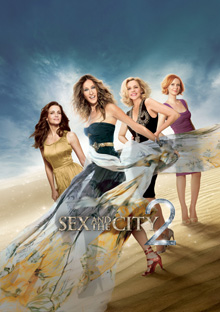
Photo: Craig Blankenhorn
Dust off your stilettos, pour yourself a martini and prepare yourself for the ultimate girls' night out. Sex and the City 2, the latest installment in the beloved Sex and the City franchise, is more than a movie. It's the perfect substitute for that exotic vacation you've always wanted to take with your closest girlfriends...but never could quite afford.
In this much-anticipated sequel, New York City's most famous, fabulous foursome—Carrie, Miranda, Samantha and Charlotte—pack their (many) bags and jet halfway around the world. They travel to the Middle East (really Morocco, but let's pretend) on a wealthy businessman's dime, and there, they discover the true meaning of opulence. And that's not all...Miranda unleashes her inner "woo!" girl, Charlotte gets real about motherhood, Samantha takes on menopause, and Carrie faces a marital crisis when she comes face-to-face with her ex-fiancé, Aidan.
Serious moments aside, Michael Scott King, the film's writer and director, says this film is a continuation of the party fans started back in 2008, when the first film was released. An over-the-top wedding reception, karaoke rendition of "I Am Woman" and swimming pool full of chiseled soccer players might make this film the can't-miss party of the summer!
Now, the film's director and stars—Michael Scott King, Sarah Jessica Parker, Cynthia Nixon, Kristin Davis, Kim Cattrall and Chris Noth—are taking questions and revealing what it was like behind the scenes. Thanksgiving dinner in a tent, what they want men to learn, menopause and more...
In this much-anticipated sequel, New York City's most famous, fabulous foursome—Carrie, Miranda, Samantha and Charlotte—pack their (many) bags and jet halfway around the world. They travel to the Middle East (really Morocco, but let's pretend) on a wealthy businessman's dime, and there, they discover the true meaning of opulence. And that's not all...Miranda unleashes her inner "woo!" girl, Charlotte gets real about motherhood, Samantha takes on menopause, and Carrie faces a marital crisis when she comes face-to-face with her ex-fiancé, Aidan.
Serious moments aside, Michael Scott King, the film's writer and director, says this film is a continuation of the party fans started back in 2008, when the first film was released. An over-the-top wedding reception, karaoke rendition of "I Am Woman" and swimming pool full of chiseled soccer players might make this film the can't-miss party of the summer!
Now, the film's director and stars—Michael Scott King, Sarah Jessica Parker, Cynthia Nixon, Kristin Davis, Kim Cattrall and Chris Noth—are taking questions and revealing what it was like behind the scenes. Thanksgiving dinner in a tent, what they want men to learn, menopause and more...
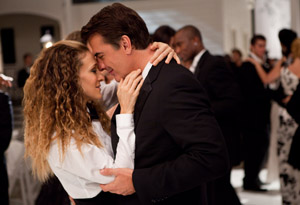
Photo: Craig Blankenhorn/Warner Bros. Pictures
Q: Can you talk about the issue your character faced in this movie? Did you relate to it personally?
Chris: I think my journey was a very interesting journey [about] the nature of having to find what a marriage means to two people who have had a very intimate and long relationship. How they miss each other at the beginning, and through the movie, [figure out] just what that tradition is and what it should be.
Cynthia: I think that for Miranda, the real issue that she's been dealing with is what to do when you have a really terrific job that you're well paid for and you've worked decades to get there, and all of a sudden, you're just miserable in it. I think that I can totally relate to that. No, I'm kidding. I'm kidding. ... The part of it I can relate to is the, as you get older and as you get more of a sense of yourself, which I think is what's happening to Miranda in the movie, [you're] learning to value yourself. You're learning to say: "You know what? If someone is treating me badly, even though maybe it's in my vested interest to keep my mouth shut, I actually have to speak out for myself. I have to protect myself, because I may define myself as a lawyer, but if I'm a miserable lawyer, better not to be a lawyer at all."
Chris: I think my journey was a very interesting journey [about] the nature of having to find what a marriage means to two people who have had a very intimate and long relationship. How they miss each other at the beginning, and through the movie, [figure out] just what that tradition is and what it should be.
Cynthia: I think that for Miranda, the real issue that she's been dealing with is what to do when you have a really terrific job that you're well paid for and you've worked decades to get there, and all of a sudden, you're just miserable in it. I think that I can totally relate to that. No, I'm kidding. I'm kidding. ... The part of it I can relate to is the, as you get older and as you get more of a sense of yourself, which I think is what's happening to Miranda in the movie, [you're] learning to value yourself. You're learning to say: "You know what? If someone is treating me badly, even though maybe it's in my vested interest to keep my mouth shut, I actually have to speak out for myself. I have to protect myself, because I may define myself as a lawyer, but if I'm a miserable lawyer, better not to be a lawyer at all."
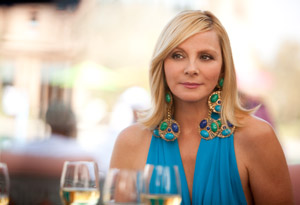
Photo: Craig Blankenhorn/Warner Bros. Pictures
Sarah Jessica: As I've been saying lately, there was a wedding, and now there has to be a marriage. The two are very different, and I think where Carrie finds herself at the top of the movie is starting, as she typically does, to ask questions about the environment in which she currently lives. Those questions and the big theme of the movie for all of us in our own way ... is tradition. And why do we run toward it? Why do we push it away, and why, when we so willingly want to commit to conventions like the institutions of marriage, do we find ourselves squirming and asking questions? And how do we redefine tradition for ourselves, and how do our friends around us redefine tradition? Do they want to? And what better place to ask these questions than in the Middle East. ... I think women of a certain generation aren't even conscious of the fact that we are asking ourselves, I mean, we are in the process of redefining our roles all the time. It's the great gift that our mothers gave us—this opportunity to rethink the roles that we take on in very conventional institutions.
Kim: Menopause, menopause...and I didn't need to do any research. I don't need to say anymore.
Kristin: Charlotte's always been very traditional, and she has very, very, very high expectations of herself in those traditions. Oftentimes, she doesn't live up to them, and possibly, the things she's trying to control in life are not really things you can control, so she's faced with, yet again, her own lack of the perfect picture that she's trying to create. [She's] even having trouble being honest with herself about the stress involved, and I think, one of my favorite things about what we did in this movie is that her friend, Miranda, can see through her facade. She knows she needs to be honest, and that's something that I think is a wonderful thing about friendship. You sometimes can see that your friend actually is not doing herself a service by keeping the facade up—that honesty is what's needed.
That's what's wonderful about going away. ... Sometimes, when you get out of your own normal, day-to-day existence, you get to appreciate it and look at it and analyze it and share about it and have this freedom that we have in the Middle East, which is ironic.
Kim: Menopause, menopause...and I didn't need to do any research. I don't need to say anymore.
Kristin: Charlotte's always been very traditional, and she has very, very, very high expectations of herself in those traditions. Oftentimes, she doesn't live up to them, and possibly, the things she's trying to control in life are not really things you can control, so she's faced with, yet again, her own lack of the perfect picture that she's trying to create. [She's] even having trouble being honest with herself about the stress involved, and I think, one of my favorite things about what we did in this movie is that her friend, Miranda, can see through her facade. She knows she needs to be honest, and that's something that I think is a wonderful thing about friendship. You sometimes can see that your friend actually is not doing herself a service by keeping the facade up—that honesty is what's needed.
That's what's wonderful about going away. ... Sometimes, when you get out of your own normal, day-to-day existence, you get to appreciate it and look at it and analyze it and share about it and have this freedom that we have in the Middle East, which is ironic.
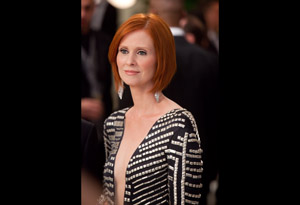
Photo: Craig Blankenhorn/Warner Bros. Pictures
Q: Why do you think the gay community has embraced the Sex and the City franchise?
Sarah Jessica: It's hard to deny that there is this wonderful search, this endeavor for love [in the series], but there is an emotional ingredient. When I talk to people in the gay community, the clothing is fun, and it's the cherry on the sundae. It's the soufflé. But I really think it's this ability to articulate emotion—embarrassing and candid and intimate and the humorous way of observing our emotional journeys—that a lot of my gay friends really, really love. I think they are very comfortable saying that, and it has taken maybe the straight community—the men—a little bit longer. They used to [tell me] at the luggage carousel, "I watch your show." Or they'll say, "My wife, my girlfriend forced me." Now, they seem to volunteer more freely the fact that, occasionally, they even watch it on their own. If the remote got stuck or not...
Cynthia: I think also because Sex and the City, right from the very beginning, there was a very conscious decision made that we would never see these people's parents. We would never with maybe one exception see their siblings—two exceptions—because they were each others' family. I think, certainly, for many gay people, and for many non-gay people, that's the reality now. Maybe you have a family that you come from that you love or maybe you have trouble with them, but you can come to New York and create your own new family.
Sarah Jessica: It's hard to deny that there is this wonderful search, this endeavor for love [in the series], but there is an emotional ingredient. When I talk to people in the gay community, the clothing is fun, and it's the cherry on the sundae. It's the soufflé. But I really think it's this ability to articulate emotion—embarrassing and candid and intimate and the humorous way of observing our emotional journeys—that a lot of my gay friends really, really love. I think they are very comfortable saying that, and it has taken maybe the straight community—the men—a little bit longer. They used to [tell me] at the luggage carousel, "I watch your show." Or they'll say, "My wife, my girlfriend forced me." Now, they seem to volunteer more freely the fact that, occasionally, they even watch it on their own. If the remote got stuck or not...
Cynthia: I think also because Sex and the City, right from the very beginning, there was a very conscious decision made that we would never see these people's parents. We would never with maybe one exception see their siblings—two exceptions—because they were each others' family. I think, certainly, for many gay people, and for many non-gay people, that's the reality now. Maybe you have a family that you come from that you love or maybe you have trouble with them, but you can come to New York and create your own new family.
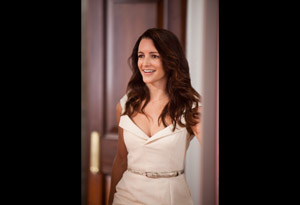
Photo: Craig Blankenhorn/Warner Bros. Pictures
Q: What's the most empowering thing about being fun, fearless women?
Kristin: I think the thing that I love the most about the thing that we've gotten to be a part of for all of this time is that we are together in it. So it's women who are different. We're different in life. Our characters are different, yet we're very, very together. No matter if we always agree, like sometimes, the characters disagree. ... I love the fact that what we've created all together—and what Michael has created in the writing for us—is these really powerful women who can be each powerful in her own right and still be together. To me, that's my favorite part of the whole experience, living through it together.
Kim: I think the most powerful thing for me is we have encouraged a lot of women to change the way they feel about being single, about having cancer. All the storylines about getting married, and then being deserted, being alone, being lonely. I think we've addressed them and encouraged them to come together. I think that's a very powerful thing in this era of post-feminism. I think that we've defined what it is to be successful, smart and, also, feminine.
Kristin: I think the thing that I love the most about the thing that we've gotten to be a part of for all of this time is that we are together in it. So it's women who are different. We're different in life. Our characters are different, yet we're very, very together. No matter if we always agree, like sometimes, the characters disagree. ... I love the fact that what we've created all together—and what Michael has created in the writing for us—is these really powerful women who can be each powerful in her own right and still be together. To me, that's my favorite part of the whole experience, living through it together.
Kim: I think the most powerful thing for me is we have encouraged a lot of women to change the way they feel about being single, about having cancer. All the storylines about getting married, and then being deserted, being alone, being lonely. I think we've addressed them and encouraged them to come together. I think that's a very powerful thing in this era of post-feminism. I think that we've defined what it is to be successful, smart and, also, feminine.
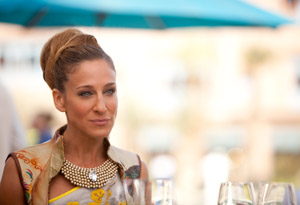
Photo: Craig Blankenhorn/Warner Bros. Pictures
Sarah Jessica: I tend not to ponder too much what we may have or may not have done, because I like hearing from other people what they think. I will say that in an era where in culture, there's this beacon, which we seem to be moving toward, where women are really unkind to one another and call each other horrible names. There's a vernacular that our ears have adopted to, which I find really objectionable. I really, really love how these women love each other, and I love how decent and honorable they are toward one another. I love how much they respect one another.
I love that they were never made to be friends—their DNA is so radically different from one to the next—and they have found this incomparable friendship that is really truly inspiring to me. It changes the way I think about my friendships constantly. It changes the way I look at friendships, respond to friends' choices, and that is, in large part, the writing. Well, it's not even a large part. It is the writing.
Cynthia: There was a time when Charlotte and Miranda were having a big fight about Charlotte's decision to stop working and to focus on having a child, and Miranda was very disapproving. Charlotte really called her on it, and Charlotte said: 'Isn't that what the feminist movement is about? It's not about you have to work or you have to stay home. It's about choices." And I think that, as Sarah said, these four women are so different from each other, and they have such different points of view. They've made such different life choices, but they love each other. And they're not shy about offering their opinions to each other.
I think that that's one of the things I'm most proud of. I think we're a feminist show, but being a feminist show doesn't mean you have to have a career or you have to not be married or you have to be married. For these four women who are very close, but very different, we see a whole range of what's available out there.
I love that they were never made to be friends—their DNA is so radically different from one to the next—and they have found this incomparable friendship that is really truly inspiring to me. It changes the way I think about my friendships constantly. It changes the way I look at friendships, respond to friends' choices, and that is, in large part, the writing. Well, it's not even a large part. It is the writing.
Cynthia: There was a time when Charlotte and Miranda were having a big fight about Charlotte's decision to stop working and to focus on having a child, and Miranda was very disapproving. Charlotte really called her on it, and Charlotte said: 'Isn't that what the feminist movement is about? It's not about you have to work or you have to stay home. It's about choices." And I think that, as Sarah said, these four women are so different from each other, and they have such different points of view. They've made such different life choices, but they love each other. And they're not shy about offering their opinions to each other.
I think that that's one of the things I'm most proud of. I think we're a feminist show, but being a feminist show doesn't mean you have to have a career or you have to not be married or you have to be married. For these four women who are very close, but very different, we see a whole range of what's available out there.
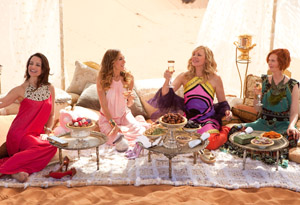
Photo: Craig Blankenhorn/Warner Bros. Pictures
Q: What was it like shooting this film in the desert?
Michael: We shot in Morocco for Abu Dhabi. Morocco has a great history of filmmaking. They did Ben-Hur. They did Lawrence of Arabia. We actually shot on the Lawrence of Arabia dunes. ... We had New York, which was here at Bergdorf's, with thousands and thousands of people watching and supporting. It's like an interactive theater piece. The girls go to talk; everybody shuts up. I say, "Action." Then, applause. ... I call that, sometimes, the "celebrity petting zoo." Every now and then, somebody breaks through, and we have to stop and get everybody back behind the barricades.
When we went to Morocco, [we were] in the middle of the Sahara desert, not a sound, not a paparazzi. It was just the crew, the hot sun and the sun falling out of the sky quickly. It was a completely different, bizarre and magical time. Different colors, different sounds, different smells, great crew—South Africans, Moroccans, Brits, Germans, everyone. It was an IHOP of crew. Big meals in tents and then...
Kim: Every meal in a tent.
Michael: We even had tents in our rooms.
Kim: We had Thanksgiving in a tent!
Sarah Jessica: It was laborious and herculean, but it was one of the great experiences of my professional life to live and work with this cast. To see the sun rise and set over our locations in the most far-flung places. To lie in a bed all day with these women, exhausted and laughing. To be on a camel with Kim Cattrall as it disobeyed all orders.
Kim: Not many people can say they've done all that.
Sarah Jessica: No, but I'm telling you, it was indescribably wonderful to be so far away, in such a wonderfully foreign place. To have this incredibly cinematic experience, to be in the dunes of the Sahara for days, and see things that we will never see again. To smell things, to eat things...I mean, yes, it was hard, but we could have not done it anywhere else this way.
Michael: It's big, old-time, old-fashioned movie making. We actually went far away and made a Hollywood movie.
Michael: We shot in Morocco for Abu Dhabi. Morocco has a great history of filmmaking. They did Ben-Hur. They did Lawrence of Arabia. We actually shot on the Lawrence of Arabia dunes. ... We had New York, which was here at Bergdorf's, with thousands and thousands of people watching and supporting. It's like an interactive theater piece. The girls go to talk; everybody shuts up. I say, "Action." Then, applause. ... I call that, sometimes, the "celebrity petting zoo." Every now and then, somebody breaks through, and we have to stop and get everybody back behind the barricades.
When we went to Morocco, [we were] in the middle of the Sahara desert, not a sound, not a paparazzi. It was just the crew, the hot sun and the sun falling out of the sky quickly. It was a completely different, bizarre and magical time. Different colors, different sounds, different smells, great crew—South Africans, Moroccans, Brits, Germans, everyone. It was an IHOP of crew. Big meals in tents and then...
Kim: Every meal in a tent.
Michael: We even had tents in our rooms.
Kim: We had Thanksgiving in a tent!
Sarah Jessica: It was laborious and herculean, but it was one of the great experiences of my professional life to live and work with this cast. To see the sun rise and set over our locations in the most far-flung places. To lie in a bed all day with these women, exhausted and laughing. To be on a camel with Kim Cattrall as it disobeyed all orders.
Kim: Not many people can say they've done all that.
Sarah Jessica: No, but I'm telling you, it was indescribably wonderful to be so far away, in such a wonderfully foreign place. To have this incredibly cinematic experience, to be in the dunes of the Sahara for days, and see things that we will never see again. To smell things, to eat things...I mean, yes, it was hard, but we could have not done it anywhere else this way.
Michael: It's big, old-time, old-fashioned movie making. We actually went far away and made a Hollywood movie.
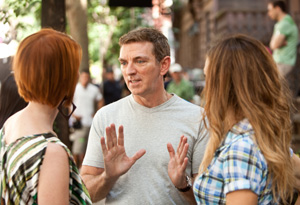
Photo: Craig Blankenhorn/Warner Bros. Pictures
Q: Michael, what was your inspiration for the Sex and the City films?
Michael: My inspiration for the first movie was the girls reuniting, and my inspiration for this movie was the audience at the first movie. When I would see the audience showing up dressed and having cocktails before and groups going out—I saw some people taking pictures of themselves in the theater seats—I thought: "This is an interactive party. This is no longer a movie." When we were lucky enough, because of the love that was thrown our way by the box office of the first movie, to do a sequel, the first thing I knew was I wanted it to be a continuation of the party for the audience. I also knew I wanted it to be completely different than the first movie. The one rule we've always tried to follow in Sex and the City from the writing camp is: "Don't repeat. Dare yourself to change it, break it, move it forward." It started out as four single girls, and very early, we married one of them off. I mean, we defied the rules. So I knew it had to be a different vibe, and I sat down to write in what was the beginning of an economic downturn, and we still are in it. I thought: "What's my job? I'm not a banker. I can't go and balance your books. I'm a moviemaker, happily."
I want to make a movie, and like they did in the Great Depression, I thought Hollywood should take people on a big vacation that maybe they couldn't afford themselves. I thought, "It's going to be a big party. I want to make a big, extravagant vacation." I don't think it was my job to have Carrie Bradshaw sell apples under the 59th Street Bridge.
Sarah Jessica: As much as I wanted to sing that song...
Michael: Yes. I think it was our job to give everybody the vacation that maybe they can't afford. Now, they can go with their girlfriends for a night out and go on vacation with their other girlfriends, which are these four ladies.
Michael: My inspiration for the first movie was the girls reuniting, and my inspiration for this movie was the audience at the first movie. When I would see the audience showing up dressed and having cocktails before and groups going out—I saw some people taking pictures of themselves in the theater seats—I thought: "This is an interactive party. This is no longer a movie." When we were lucky enough, because of the love that was thrown our way by the box office of the first movie, to do a sequel, the first thing I knew was I wanted it to be a continuation of the party for the audience. I also knew I wanted it to be completely different than the first movie. The one rule we've always tried to follow in Sex and the City from the writing camp is: "Don't repeat. Dare yourself to change it, break it, move it forward." It started out as four single girls, and very early, we married one of them off. I mean, we defied the rules. So I knew it had to be a different vibe, and I sat down to write in what was the beginning of an economic downturn, and we still are in it. I thought: "What's my job? I'm not a banker. I can't go and balance your books. I'm a moviemaker, happily."
I want to make a movie, and like they did in the Great Depression, I thought Hollywood should take people on a big vacation that maybe they couldn't afford themselves. I thought, "It's going to be a big party. I want to make a big, extravagant vacation." I don't think it was my job to have Carrie Bradshaw sell apples under the 59th Street Bridge.
Sarah Jessica: As much as I wanted to sing that song...
Michael: Yes. I think it was our job to give everybody the vacation that maybe they can't afford. Now, they can go with their girlfriends for a night out and go on vacation with their other girlfriends, which are these four ladies.
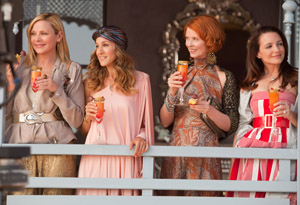
Photo: Craig Blankenhorn/Warner Bros. Pictures
Q: What were your best memories of Morocco?
Sarah Jessica: So much...
Cynthia: I feel like those first very heady days in the desert, I mean, that was such an introduction. Like, "Wow, we really are far, far away in place that we've never been before." What was so great was we were mostly in Marrakech, but then our first filming was out in the desert. So we all—cast and crew—were on a plane, and when we arrived, they had musicians waiting to greet us.
Kim: And scarves!
Cynthia: We were then taught—not us because we were in wardrobe—but everyone else was taught to tie turbans to help keep you cool in the desert. It was just so amazing to land in this small airport, kind of in the middle of nowhere, and to be greeted it was just...
Kim: It was touching.
Cynthia: It was amazing.
Sarah Jessica: So much...
Cynthia: I feel like those first very heady days in the desert, I mean, that was such an introduction. Like, "Wow, we really are far, far away in place that we've never been before." What was so great was we were mostly in Marrakech, but then our first filming was out in the desert. So we all—cast and crew—were on a plane, and when we arrived, they had musicians waiting to greet us.
Kim: And scarves!
Cynthia: We were then taught—not us because we were in wardrobe—but everyone else was taught to tie turbans to help keep you cool in the desert. It was just so amazing to land in this small airport, kind of in the middle of nowhere, and to be greeted it was just...
Kim: It was touching.
Cynthia: It was amazing.
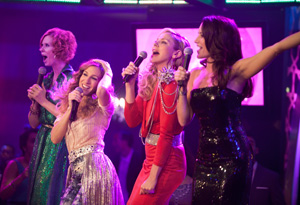
Photo: Craig Blankenhorn/Warner Bros. Pictures
Sarah Jessica: The thing that I cherish most about it, and therefore it's the most vivid memory, is that I got to live with this cast. We were removed. We were shooting out of the country—the first time we've never done that—and we had this chance to live together and to know one another in a way we have never had an opportunity to do so in New York. In New York, we go home to our friends and our family and our children and our animals. For me, it just changed everything. I just came away loving them more than I ever have because I got to see them in a new way. I was so reliant upon them, and they became evermore necessary. I was so challenged by the work that they were doing and how good they were and what thoroughbreds they were. And how nothing could get us down, no matter how hungry we were or how much we had to use the bathroom or hour 18 of day 58.
Kim: I think it was also we were so welcomed by the people of Morocco and felt so protected. We really did feel like royal family. I couldn't believe people actually watched the show—that was kind of surprising—and knew the characters. They didn't know our names in particular, but kept calling us by our characters' names. We would actually turn and say "hello," but we also had weekends off, so it was a bit of a vacation. Mostly, on locations, you don't get that. You usually work on a Saturday, so we had this intense family time, which Sarah's talking about. But on the weekends, we got to go and explore. If by chance you had a day off, which was very seldom, you could go to the mountains or you could go to the beach. It's just such an extraordinary country.
Kristin: One hundred percent. So beautiful, so beautiful. I echo everything that was said, and I'm just going to say Thanksgiving, since we were together. We got to have two Thanksgivings. Our fantastic English caterers made an American Thanksgiving for us, which they thought just the Americans would want to eat, but then everybody wanted to eat it.
Sarah Jessica: They ran out!
Kim: There was none left.
Kristin: They ran out of like the apple pie and the pumpkin pie. Everybody loved it, and then, because the boys could come—Cynthia's and Sarah's sons came to visit for the weekend—we decided we would have another Thanksgiving at our hotel. They did a fantastic job, and we had snake charmers come for the boys because we were in Morocco.
Kim: I think it was also we were so welcomed by the people of Morocco and felt so protected. We really did feel like royal family. I couldn't believe people actually watched the show—that was kind of surprising—and knew the characters. They didn't know our names in particular, but kept calling us by our characters' names. We would actually turn and say "hello," but we also had weekends off, so it was a bit of a vacation. Mostly, on locations, you don't get that. You usually work on a Saturday, so we had this intense family time, which Sarah's talking about. But on the weekends, we got to go and explore. If by chance you had a day off, which was very seldom, you could go to the mountains or you could go to the beach. It's just such an extraordinary country.
Kristin: One hundred percent. So beautiful, so beautiful. I echo everything that was said, and I'm just going to say Thanksgiving, since we were together. We got to have two Thanksgivings. Our fantastic English caterers made an American Thanksgiving for us, which they thought just the Americans would want to eat, but then everybody wanted to eat it.
Sarah Jessica: They ran out!
Kim: There was none left.
Kristin: They ran out of like the apple pie and the pumpkin pie. Everybody loved it, and then, because the boys could come—Cynthia's and Sarah's sons came to visit for the weekend—we decided we would have another Thanksgiving at our hotel. They did a fantastic job, and we had snake charmers come for the boys because we were in Morocco.
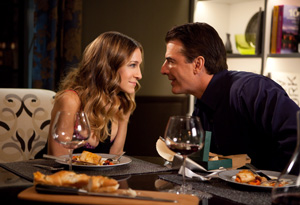
Photo: Craig Blankenhorn/Warner Bros. Pictures
Q: Can you tell us what you want men to learn from this film?
Michael: I think they'll be surprised how much the movie is for them. When I sat down to write, I realized that Mr. Big is now very, very prominently a part of Carrie Bradshaw's life. Also, there's a couple of deliberate shout-outs to men in this movie, in terms of their point of the view, because it is the struggle of the man and woman together that makes the women even better.
Chris: I will say one thing. There is something that happens—an event that happens. ... I give credit to the writer and Mr. Big, who turn poison into medicine and not go to the impulsive place men often do in an event like. And instead, [he] creates a bridge to a deeper relationship. I think that's something.
Sarah Jessica: The couple people I've spoken to, they're straight men. ... They love that the men—there is not a villainous move by any man in this movie. Any consequences are on the part of us and the choices we're making...and some momentary reckless behavior or a cavalier attitude about cultural standards. It's all us, and we come home, frankly, a little wiser.
More from the Sex and the City stars
Fabulous fashions from Sex and the City 2
Michael: I think they'll be surprised how much the movie is for them. When I sat down to write, I realized that Mr. Big is now very, very prominently a part of Carrie Bradshaw's life. Also, there's a couple of deliberate shout-outs to men in this movie, in terms of their point of the view, because it is the struggle of the man and woman together that makes the women even better.
Chris: I will say one thing. There is something that happens—an event that happens. ... I give credit to the writer and Mr. Big, who turn poison into medicine and not go to the impulsive place men often do in an event like. And instead, [he] creates a bridge to a deeper relationship. I think that's something.
Sarah Jessica: The couple people I've spoken to, they're straight men. ... They love that the men—there is not a villainous move by any man in this movie. Any consequences are on the part of us and the choices we're making...and some momentary reckless behavior or a cavalier attitude about cultural standards. It's all us, and we come home, frankly, a little wiser.
More from the Sex and the City stars
Fabulous fashions from Sex and the City 2



